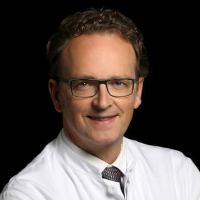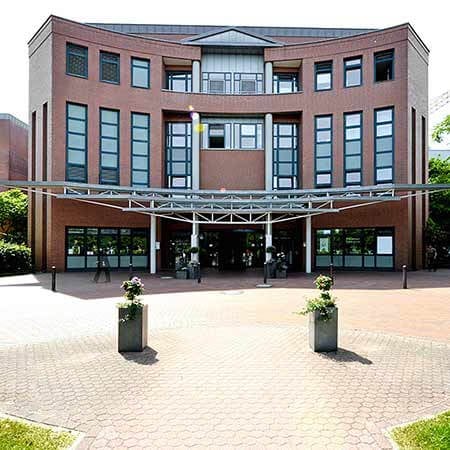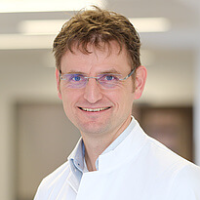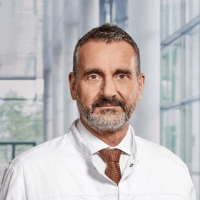Endovascular Tricuspid Valve Repair for Tricuspid Valve Insufficiency in Germany
Treatment prices are regulated by national law of the corresponding countries, but can also include additional hospital coefficients. In order to receive the individual cost calculation, please send us the request and medical records.

Department of Cardiothoracic Surgery
According to the Focus magazine, the Department of Cardiothoracic Surgery ranks among the top German medical facilities specializing in the surgical treatment of diseases of the cardiovascular system and lung cancer! The department offers the full range of surgical services for the treatment of diseases of the cardiovascular system, respiratory tract, including heart and lung transplantation, artificial heart implantation. The therapeutic options include aortic surgery, coronary artery bypass grafting, transplantation surgery, surgical treatment of heart rhythm disorders (arrhythmias), minimally invasive surgery, surgical treatment of the heart valves, including reconstructive interventions. All operations are performed using state-of-the-art technology and in accordance with the current recommendations of professional societies.






Department of Cardiac Surgery
The Department of Cardiac Surgery provides a full range of surgical treatment in its area of specialization. Special emphasis is placed on heart valve repair and replacement surgery, coronary artery bypass grafting, thoracic aortic surgery, adult congenital and acquired heart disease surgery, pacemaker and defibrillator implantation, and artificial heart implantation for severe heart failure. Many heart operations are performed using minimally invasive techniques, which has a positive effect on the healing of the surgical wound. Minimally invasive cardiac procedures also reduce surgical risks and contribute to a rapid recovery of the patient in the postoperative period. Surgical treatment of cardiac pathologies is performed in advanced operating rooms equipped with the latest technology. The cardiac surgeons of the department successfully perform routine and complex surgical procedures, saving the lives of thousands of patients. The specialists work in accordance with current clinical protocols and follow the recommendations of the German Society for Thoracic and Cardiovascular Surgery (DGTHG).


Department of Cardiothoracic Surgery and Vascular Surgery
The Department of Cardiothoracic Surgery and Vascular Surgery provides effective surgical treatment for diseases of the heart, respiratory system, and blood vessels. The team of cardiac surgeons operates on patients with heart valve pathologies, coronary heart disease, heart failure, and heart rhythm disturbances. In the field of thoracic surgery, the key focus is on the surgical removal of lung tumors and lung metastases. The specialists in this area also perform surgery to repair chest wall deformities. In the field of vascular surgery, interventions for abdominal and thoracic aortic aneurysms are most often performed here. The department's vascular surgeons are also exceptionally competent in the treatment of peripheral occlusive arterial disease. A great advantage for the department's patients is that almost all surgical interventions are performed using minimally invasive techniques, so there is no need for a long postoperative recovery. The department's operating rooms are equipped with state-of-the-art technology. This allows for effective and safe treatment. The priority is always personalized medical care for patients.






Tricuspid valve regurgitation is a common heart disease in older patients. It is usually secondary, caused by the fibrous ring enlargement. This condition develops due to mitral defects, coronary heart disease, and heart failure. A problem that impairs hemodynamics is an increased diameter and area of the tricuspid valve. The area of the heart valve can be reduced with the help of surgery. If you opt to undergo your treatment in Germany, there is another option for solving the problem: a minimally invasive procedure that is performed from the inside of the blood vessels. The procedure is non-traumatic and does not require any long-term rehabilitation. You can use the Booking Health service to find out the cost of treatment in Germany, compare prices at different hospitals, and choose a treatment program that is best for you.
Content
- Who may be a candidate for endovascular treatment of tricuspid valve insufficiency?
- How is tricuspid valve repair performed?
- Treatment outcomes for tricuspid valve insufficiency
- Why to undergo your tricuspid valve insufficiency treatment in Germany?
Who may be a candidate for endovascular treatment of tricuspid valve insufficiency?
Endovascular repair of tricuspid valve insufficiency is not considered the first choice. It is used only if there are contraindications to open surgical repair or heart valve replacement.
Operations on the tricuspid valve are complex, unsafe, and have a high mortality rate, which reaches 30% in countries with a low level of medicine and about 10% in Germany. At the same time, the risk of complications reaches 40% even in developed countries.
Surgical interventions on the tricuspid valve are significantly more dangerous for a patient and have worse outcomes as compared to operations on the mitral or aortic heart valve. Open surgical interventions are therefore avoided by doctors whenever possible, especially in elderly and debilitated patients who often have cardiac arrhythmias and heart failure.
For many patients, an endovascular intervention is a good alternative to traumatic open surgery. The procedure allows doctors to achieve good, long-term results with minimal health risks and without the need for a long postoperative recovery.
Up to 90% of cases of tricuspid regurgitation are a secondary form of heart disease. This means that the heart valve itself is not damaged, but the opening that it closes is enlarged due to dilatation of the right ventricle and atrium. Therefore, the main goal of endovascular tricuspid valve repair is to reduce its area to lower the severity of tricuspid regurgitation and improve heart function.
How is tricuspid valve repair performed?
The procedure is performed without any chest incisions. Doctors make an incision in the groin to enter the right chambers of the heart through the blood vessels. The approaches and techniques for performing the procedure vary for different types of devices. However, in any case, the treatment of tricuspid valve disease is minimally traumatic without general anesthesia and without a significant risk of complications typical of open surgery. Patients do not require long-term rehabilitation after the intervention.
The first tricuspid valve repair using an endovascular technique was performed in Germany. Doctors used the Mitralign system to reduce the size of the tricuspid valve annulus. This procedure was successfully carried out in 2015. The system was not used for its intended purpose. As its name suggests, it was originally developed for mitral valve repair. The Mitralign implantation procedure is performed through an incision in the groin. The system is implanted through the jugular vein.
Later, doctors began to perform valve repairs using other systems. For example, physicians have successfully implanted the Israeli-made Cardioband system. This is a Dacron band, which is put on the fibrous ring of the tricuspid valve by gradually screwing in the fixing elements. If necessary, these can be removed from the fibrous ring to implant them differently. The procedure is performed under transesophageal echocardiography guidance. Healthcare professionals in Germany use a 3D version of the procedure. The band is tightened under echocardiography guidance until the target values of the tricuspid valve orifice area are achieved.
The Cardioband system has been used relatively recently. Only in 2015 were the results of the first prospective trial of its use in a group of patients with mitral insufficiency presented. Since 2021, there have been publications that describe the use of Cardioband for the repair of secondary tricuspid valve insufficiency.
Treatment outcomes for tricuspid valve insufficiency
In 2022, the results of the examination of patients one year after the treatment of severe tricuspid insufficiency using the Cardioband system were published. The trial included 37 patients with an average age of 78 years. About 97% of them had atrial fibrillation.
After 1 year, about 73% of treated patients had grade 2 or lower tricuspid valve regurgitation. The reduction in the size of the annulus fibrosus persisted. Only 5% of cases required revision intervention. In 92.3% of patients, the functional class of heart failure decreased to 1 or 2. The authors concluded that transcatheter valve repair is:
- safe;
- provides good results that persist a year after treatment;
- provides a low rate of repeated hospitalizations;
- improves the quality of life.
Good results are also achieved with other systems. These help reduce the severity of tricuspid valve disease in conditions where other treatment methods are not possible due to contraindications. Patients feel better almost immediately after the procedure. They experience less need for drug therapy and better tolerate physical activity.
Benefits of endovascular tricuspid valve repair include the following:
- minimal trauma rates;
- no need for general anesthesia;
- does not require a long recovery;
- a short hospital stay;
- a low risk of cardiac complications and a low mortality rate as compared to open heart surgery.
Why to undergo your tricuspid valve insufficiency treatment in Germany?
Doctors at German hospitals achieve excellent results in the treatment of tricuspid valve defects and other heart diseases. It was here that the world's first endovascular tricuspid valve repair procedure was performed using the Mitralign system. Although minimally invasive procedures on the tricuspid valve are not yet available in many countries, endovascular treatment for tricuspid regurgitation has been performed in Germany for several years.
There are a few reasons for you to undergo your treatment in Germany. These are the following:
- German hospitals have state-of-the-art equipment;
- doctors with extensive experience in the minimally invasive treatment of tricuspid valve diseases work in German medical facilities;
- doctors use the latest systems for a tricuspid percutaneous annuloplasty;
- minimally invasive treatment of several heart defects can be performed simultaneously, for example, additional elimination of mitral regurgitation;
- a low risk of complications from endovascular procedures;
- high-quality care and comfortable conditions at German hospitals;
- a relatively low cost of treatment in Germany as compared to other developed countries.
You are welcome to use the Booking Health service to undergo your tricuspid valve repair at a German hospital, find out the cost of treatment in Germany, and choose a medical care program at the best price. Even the most severe heart diseases are successfully treated here. When you make an appointment at the hospital through Booking Health, the cost of treatment in Germany will be lower than if you contact the hospital directly. Prices are reduced due to the absence of additional taxes for foreign patients.
The Booking Health specialists will arrange your treatment in Germany. We will contact the hospital administration, book the nearest hotel to the hospital for you, buy airline tickets, and translate your medical documents into German. Our company's employees will also meet you at the airport, take you to the hospital, and provide interpreting services. After the completion of the treatment of your disease, you will be taken back to the airport.
Authors:
The article was edited by medical experts, board-certified doctors Dr. Nadezhda Ivanisova and Dr. Vadim Zhiliuk. For the treatment of the conditions referred to in the article, you must consult a doctor; the information in the article is not intended for self-medication!
Sources:
European Society of Cardiology

